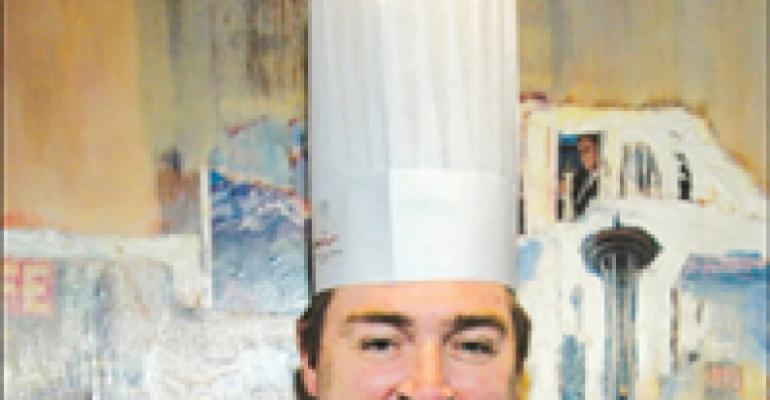For years Raimund Hofmeister’s name has been synonymous with education. The classically trained, certified master chef ran the chef’s apprentice program for the Westin Hotels, founded the Los Angeles Culinary Institute and helped grow the culinary arts program at the Art Institute of Las Vegas as its academic director. He has been inducted into the International Food & Beverage Forum Hall of Fame at Johnson & Wales University, and last year the American Culinary Federation named him National Culinary Educator of the Year. All of that explains why Hofmeister surprised everyone last fall when he left academia for the top chef’s job at the top of the Space Needle in Seattle.
Why did you decide to get back into the restaurant business?
Everybody is perplexed over my move. They thought I would go the rest of my life in education. I wanted to take a job with a real, real challenge. Lots of changes are expected to this 45-year-old attraction. We call it the “Space-less” Needle because there really is no space. To do anything upscale is a challenge.
But why leave education?
After I won the [ACF] award, I evaluated my achievements and decided to get out of education and go back to the real world with real people and have some fun again. I had had enough of the drama. It’s amazing what goes on in culinary schools these days.
What goes on?
FAST FACTS
JOB: executive chef and food and beverage general manager, SkyCity Restaurant in the Space Needle, Seattle
EDUCATION: apprenticed and trained in the German cities of Baden-Baden and Villingen
EXPERIENCE: 40 years of international experience on four continents; 20 years with the Westin Hotels and Resorts, including 13 years as executive chef at the Century Plaza Hotel in Los Angeles; chef in charge of culinary events in Los Angeles for then-president Ronald Reagan and the first family; and chef at the Graf Orloff Premier Private Business Club in Moscow, overseeing special events for the Kremlin, Boris Yeltsin, Vladimir Putin and Moscow mayor Yury Luzhkov
BIRTHPLACE: wine region of Rhein-Mosel in Germany
AGE: 57
I totally resent the corporate structure in culinary schools, the big ones specifically. The ethics and education have really shrunk over the years. When you pay tuition, a certain amount has to go to the shareholders, the operators and very little goes back into education.
What you have today are students trying to learn in two years what it took me 20 years to learn. All these students are graduating with an incredible lack of skills. Kids come out of school having to pay back the $40,000 or $80,000 in tuition, but they are not able to start at the sous-chef level. They still start at an entry-level position, no matter what degree they have. They’re making $10, $11, $15 an hour.
Would you advise aspiring chefs not to attend culinary school?
No. I think the future will require a degree. Look at what’s happened in the last 25 years. We’ve moved from culinary apprenticeships in the industry to a total degree society. I would advise them to think strongly about what school to sign up with. And I think the national accreditation agencies have to have a much closer look at how schools are run, what is taught and what is really important for a chef to succeed.

